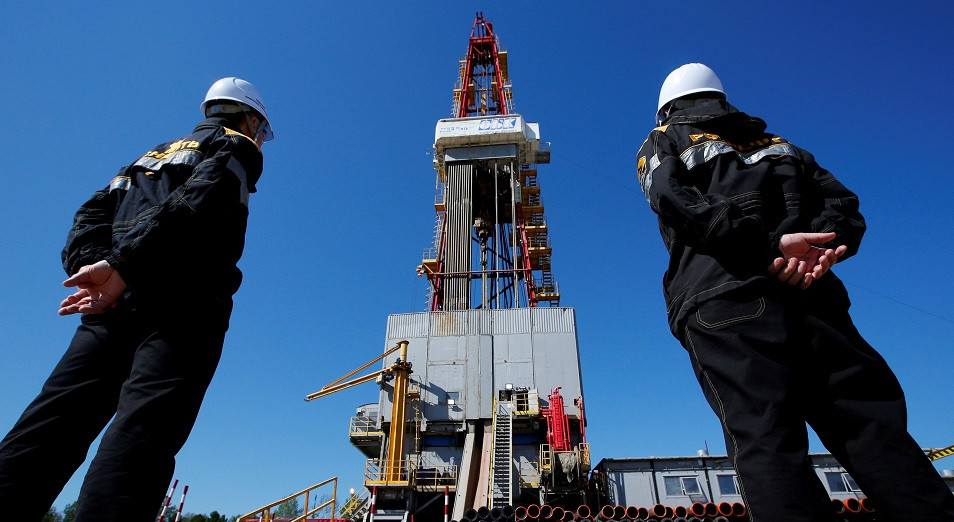Kazakhstan’s Energy Ministry dismissed reporting that Astana is planning to withdraw from the multilateral oil production cut agreement that was reached between OPEC and non-OPEC oil producing countries last year in an attempt to reduce global overstock and boost prices.
“In connection with the latest incorrect publications in some well-known news agencies, Kazakhstan once again confirms its previous commitments on the deal to limit oil production between the OPEC and non-OPEC countries,” Askar Dzhaldinov, an advisor to the country’s energy minister, told Caspian News.
Kazakhstan’s Energy Minister Kanat Bozumbayev is in Istanbul, where he is attending the 22nd World Petroleum Congress. Before the congress’ opening on Monday, Bozumbayev spoke to the press, after which it was reported that Kazakhstan may pull out from the oil cut agreement.
On Sunday, Russia’s state-owned TASS news agency reported that Kazakhstan is looking to exit the agreement. The story was later repeated by Reuters and republished by the New York Times on Sunday.
Dzhaldinov believes that the journalists, dissatisfied with the minister’s reply, decided to interpret it in their own way.
“We will continue to adhere to commitments taken until April 2018. As there were no proposals to extend or change the level of commitments, this issue is not being considered at the moment,” Dzhaldinov said.
OPEC, a global oil cartel with 13 member states, was forced to cut supplies after market turbulence caused oil prices to plunge from $115 a barrel in 2014 to less than $30 just two years later.
On March 26, the joint committee of ministers from OPEC and non-OPEC oil producers agreed to review whether a global pact to limit supplies, brokered last year, should be extended for another six months, from July through the end of this year. Negotiations continued on May 25 at a meeting in Vienna, which extended the agreement until April 2018, retaining the previous quotas for all participants.
Along with other non-OPEC countries like Azerbaijan, Russia and Bahrain, Kazakhstan agreed to reduce output by 20,000 barrels per day for six months beginning January 1, 2017, in an attempt to boost global prices, which have not surpassed $56 per barrel in over a year.
Kazakhstan holds three percent of the world’s total reserves, placing it in the number 12 spot globally and making it the third largest oil producer in the Caspian region, after Iran and Russia. Sixty two percent of Kazakhstan’s land mass covers areas containing oil and natural gas, and there are 172 oil fields throughout the country, of which more than 80 are under development.
More than 90 percent of Kazakhstan’s oil is concentrated in its 15 largest fields, which include Tengiz, Karachaganak and Kashagan. But oil output from these three giant fields was not reduced, per the cuts agreement reached in 2016.
“It is impossible to limit production at Kashagan at all, since there are obligations, and huge sums are invested [in the project],” Bozumbayev said in 2016.
Kashagan, Kazakhstan’s largest oil field, was discovered 17 years ago along the country’s Caspian Sea coastline. Its reserves are estimated to be 38 billion barrels, while its natural gas reserves are more than one trillion cubic meters.
Kashagan is part of the North Caspian project and is being developed by the joint North Caspian Operating Company (NCOC), which includes AgipCaspian Sea, KMG Kashagan B.V., the French Total EP Kazakhstan, the US ExxonMobil Kazakhstan Inc., the Anglo-Dutch Shell Kazakhstan Development B.V., Chinese CNPC and Japanese Inpex.







 The Mine Action Agency of Azerbaijan (ANAMA) reported on Thursday the discovery of a significant amount of explosives in the Khojavand district of ...
The Mine Action Agency of Azerbaijan (ANAMA) reported on Thursday the discovery of a significant amount of explosives in the Khojavand district of ...
 Iran’s Foreign Minister, Hossein Amir-Abdollahian, has labeled a foiled Israeli drone attack in certain parts of the country as a "failure" for Isr...
Iran’s Foreign Minister, Hossein Amir-Abdollahian, has labeled a foiled Israeli drone attack in certain parts of the country as a "failure" for Isr...
 Iran has refuted reports of alleged damage to Shimon Peres Negev Nuclear Research Centre located southeast of Dimona, Israel, during the recent air...
Iran has refuted reports of alleged damage to Shimon Peres Negev Nuclear Research Centre located southeast of Dimona, Israel, during the recent air...



